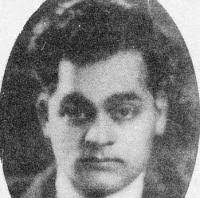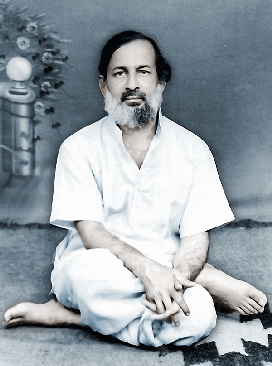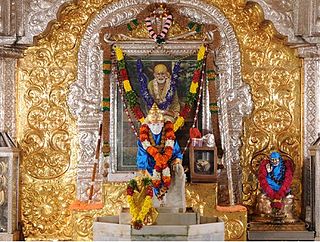
Sai Baba of Shirdi, also known as Shirdi Sai Baba, was an Indian spiritual master and fakir, considered to be a satguru (Vedanta) or a qutub (Sufism) by many scholars. revered by both Hindu and Muslim devotees during and after his lifetime. According to accounts from his life, Sai Baba preached the importance of "realisation of the self" and criticised "love towards perishable things". His teachings concentrated on a moral code of love, forgiveness, helping others, charity, contentment, inner peace, and devotion to God and Guru. Sai Baba's samadhi mandir is located at Shirdi in the Rahata taluka of Ahmednagar District.

Sathya Sai Baba was an Indian guru and phlianthropist. At the age of fourteen, he claimed that he was the reincarnation of Shirdi Sai Baba, and left his home to accept his devotees.

Shirdi is a city and pilgrimage site in the Indian state of Maharashtra. Shirdi is home to 19th century Indian satguru Sai Baba's samadhi mandir. It is located in the Rahata taluka of Ahmednagar District. It is accessible via the Ahmednagar–Malegaon State Highway No.10, approximately 83 km (52 mi) from Ahmednagar and 15 km (9.3 mi) from Kopargaon. It is located 185 km (115 mi) east of the Ahmednagar–Manmad road. Shri Saibaba Sansthan Trust is located in Shirdi.
The Sathya Sai Baba movement is a new religious movement inspired by South Indian Neo-Hindu guru Sathya Sai Baba who taught the unity of all religions. Some of his followers have faith in his claim to be a purna Avatar of Shiva and Shakti, who is believed to have been predicted in the Bhagavad Gita. This means that some of his followers see him as a God. Devotees engage in singing devotional songs called "bhajans" and selfless service (seva). Its official organization is the Sathya Sai Organization. However the Sathya Sai Baba movement extends beyond the organization. An important aspect of the faith of adherents is the miracles attributed to Sathya Sai Baba. The number of adherents is estimated between 6 and 100 million.

The Shirdi Sai Baba movement is the religious movement of the followers and devotees of the 19th- and early 20th-century Indian saint Sai Baba of Shirdi. It has spread from Indian Hindus and Muslims across the world. Sai Baba is worshipped by people of all regions and is called ‘Baba’, meaning father or grandfather, by devotees. He is a spiritual guru known for his divine powers and miracles.

Kumarsen Samarth was an Indian film director. He belonged to a Marathi CKP family. His inclination towards the Marathi language led him to direct some great Marathi/Hindi movies such as Nal Damyanti and Rupaye ki Kahani (1948). His biggest success was the 1955 Marathi film titled Shirdi che Saibaba on the life of the 19th century holyman by the same name. He studied cinematography in Germany and came back to India. He married his distant cousin, Shobhna Samarth, an aspiring actress. They married on the condition that she would be allowed to continue her acting career. They had four children, including the famous film actresses Nutan and Tanuja. He and his wife even made some films together. After fourteen years of marriage, Kumarsen and Shobhana separated amicably but never divorced. After their separation, Shobhana lived with film actor Motilal. Kumarsen died in his mid-70s.

Malik Ek is a Hindi spiritual film on Sai Baba of Shirdi featuring Jackie Shroff, Manoj Kumar and Divya Dutta. Shroff plays in the title role. The film is directed by Deepak Balraj Vij and the music is scored by Anup Jalota, who also plays the role of Das Ganu. The film was released on 29 October 2010.
Vijayachander,, is an Indian actor, director and producer, known for his works in Telugu cinema, theatre, and television. Regarded as one of the finest character actor's of Telugu cinema, Vijayachander has appeared in more than forty feature films in a variety of roles.

Anjali Devi was an Indian actress, model and producer in Telugu and Tamil films. She was well known for her role as the Devi Sita in Lava Kusa as well as for the title roles in movies like Chenchu Lakshmi, Suvarna Sundari and Anarkali.
Ganesh Srikrishna Khaparde was an Indian lawyer, scholar, political activist and a noted devotee of Shirdi Sai Baba and saint Gajanan Maharaj.

Sri Acharya Ekkirala Bharadwaj Swamy Varu, was a Dattatreya incarnation and who authored many Hindu spiritual books, primarily on the life and worship of Shirdi Sai Baba and Sri Dattatreya. He is well known as "Sri Sai Master". He had born in the Bharadwajasa gotra like SriPada Swamy. He is the fourth son of Sri Ekkirala Ananthacharya and Srimathi Buchamma. Sri Ekkirala Bharadwaj written Telugu-language book Sri Sai Leelamrutham is one of the famous book. Sri Ekkirala Bharadwaja later translated the book to English with the name Sai Baba The Master which is also a popular one. He also wrote "Sri Guru Charitra" in English and Telugu. He also has written many spiritual books in Telugu and English.
Rushyendramani was an Indian actress, singer, dancer, and playback singer from Andhra Pradesh. She had more than 150 movies to her credit and acted in Telugu, Tamil, Kannada, Malayalam and Hindi films from 1935 to 1986. Her notable films include Sri Seetarama Jananam (1944), Malliswari (1951), Vipra Narayana (1954), Chintamani (1956). Her last film was Sri Shirdi Saibaba Mahathyam (1986).
Shirdi Sai Baba Temple is a Hindu temple located in the neighbourhood of Mylapore in Chennai, India. It is dedicated to the Indian saint Sai Baba of Shirdi.

Shirdi Sai is a 2012 Indian Telugu-language biographical film, produced by A.Mahesh Reddy on AMR Sai Krupa Entertainments banner, directed by K. Raghavendra Rao. Starring Nagarjuna as the 19th-20th century spiritual guru Sai Baba of Shirdi who lived in western India, it is the cinematic depiction of some of his landmark life episodes, his teachings and his way of life. Music was composed by M. M. Keeravani. Shirdi Sai was released worldwide on 6 September 2012, and has received mixed to positive reviews while Nagarjuna received critical acclaim for his performance in the title role with most reviewers hailing this as one of his career best performances.
Pilisthe Palukutha is a 2002 Indian Telugu-language divine romantic film directed by Kodi Ramakrishna. The film stars Akash, Shamita Shetty with Vijay Chandar in a supporting role. The film was released on 18 October 2002. Music and background score by M. M. Keeravani.

Thaai Mookaambikai is a 1982 Indian Tamil-language devotional film directed by K. Shankar, starring K. R. Vijaya, Jaishankar, Sivakumar, Sujatha and other leading actors. The film was released on 9 July 1982.

Nagarjuna is an Indian actor and producer who works in the Telugu cinema. He has acted in over 100 films as a lead actor as well as playing supporting and cameo roles, including Hindi and Tamil cinema. He has received nine state Nandi Awards, three Filmfare Awards South, and one Special Mention at the National Film Awards. The 1996 film Ninne Pelladata which he produced, was declared the Best Telugu film of the year at the National Film Awards.

Sri Naga Sai Mandir is a Hindu temple dedicated to the Indian Spiritual Master Shirdi Sai Baba in Coimbatore in the Indian state of Tamil Nadu.

This is the Tamil discography of veteran Indian male playback singer K. J. Yesudas, who sang in over 700 songs in Tamil films. He Sang the most in Tamil. Yesuda's first film was in the film Bommai (1963) as Neeyum Bommai Naanum Bommai composed by S. Balachander.
Mere Sai - Shraddha Aur Saburi is an Indian Hindi-language historical drama television series which aired on Sony Entertainment Television from 25 September 2017 to 7 July 2023. It starred Abeer Soofi initially from 2017-2019 and later on Tushar Dalvi from 2019-2023 in the lead role along with Kishori Godbole, Vaibhav Mangle in supporting roles. The show traces the journey of Sai Baba of Shirdi, a fakir who after witnessing the injustices due to religious and caste discrimination, faces several trials and tribulations on his journey to bring peace and love to the society.













